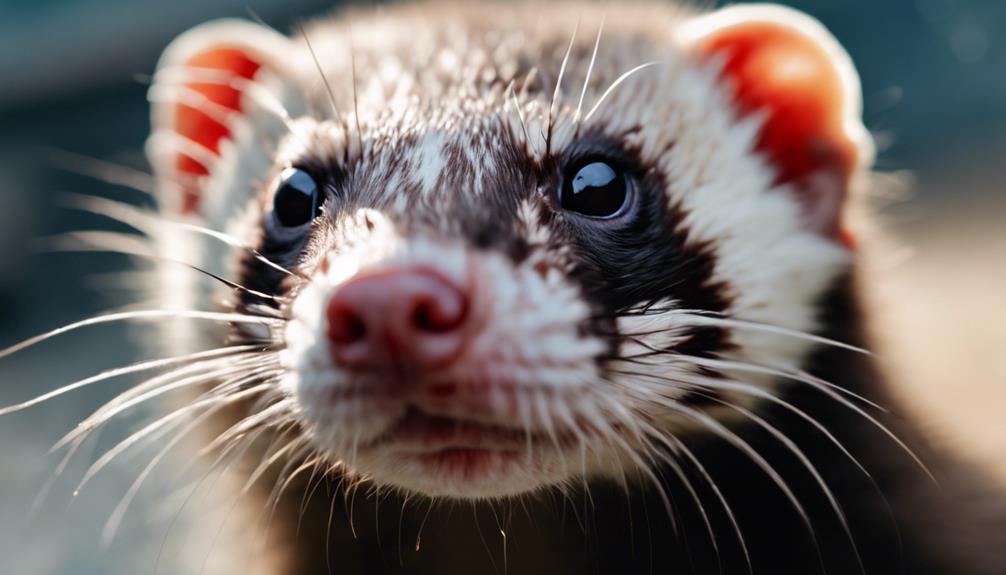When Is It Time to Take Your Ferret to the Vet?

Signs Your Ferret Needs a Vet:
Wilting like a fading flower? Time for a check-up!
Look out for subtle cues.
Lethargy and Unusual Behavior
Is your ferret acting tired and strange? It's important to take them to the vet right away to check for any health issues. Here's why:
- Ferrets are usually full of energy and love to play. If they suddenly don't want to play, it could mean something is wrong.
- Ferrets are most active at dawn and dusk. If your ferret is sleeping a lot during these times or having trouble sleeping, it might be a sign of a problem.
Loss of Appetite or Weight

Is Your Ferret Not Eating? Here's What You Need to Know!
Hey there, ferret friend! If you've noticed your furry buddy losing interest in their food or shedding some weight, it's time to take action. These signs could mean your ferret isn't feeling their best, and we want to help you understand why.
Let's break it down in simpler terms:
- Refusing to Eat: If your ferret is turning their nose up at meals, it could be due to dental problems causing pain while munching. It's like having a toothache every time you take a bite!
- Weight Loss: If your ferret is slimming down without a clear reason, it might signal digestive issues at play. Think of it as their tummy not working as it should.
- Changes in Grooming: If your ferret isn't keeping up with their usual grooming routine, it could hint at underlying discomfort or illness. Just like when you don't feel like getting dressed up when you're not well.
Here's what you should do next:
- Consult a Vet: If dental issues are causing the fussiness, a vet can check your ferret's teeth to help them eat comfortably again.
- Seek Veterinary Advice: For unexplained weight loss or digestive concerns, a vet can give your ferret a thorough check-up to pinpoint the problem.
- Keep a Close Eye: Monitor your ferret's behavior and grooming closely. Any changes could be a sign that something's not quite right, and it's best to seek professional help if needed.
Respiratory Issues

When a ferret exhibits signs of labored breathing, persistent coughing sounds, or sneezing and wheezing, it may be experiencing respiratory issues.
These symptoms could indicate underlying health concerns that require prompt veterinary attention to ensure the ferret's well-being.
Monitoring and addressing respiratory problems early can help prevent complications and improve the ferret's quality of life.
Labored Breathing Signs
Is your ferret having trouble breathing? It could be a sign of serious respiratory issues that need quick attention. Let's learn about the signs to watch for and how to help your furry friend:
Have you noticed any of these signs in your ferret?
- Breathing fast and shallow
- Making wheezing or crackling sounds while breathing
- Flaring nostrils or breathing with an open mouth
- Bluish tint on the gums or skin
- Reluctance to move or eat
If you see these signs, it's crucial to take your ferret to the vet right away. Treatment options may include medications, nebulization, or oxygen therapy. To prevent respiratory problems, keep your ferret's living area clean, avoid smoke and strong odors, and ensure good ventilation.
Persistent Coughing Sounds
Is your ferret coughing a lot? Let's find out why and what you can do about it!
When your furry friend keeps coughing, it could be a sign of something serious. Here's a breakdown of why ferrets cough and why a trip to the vet is crucial:
- Respiratory Infection: If your ferret has a respiratory infection, it's urgent to see the vet.
- Heart Disease: Immediate attention is needed if heart disease is causing the coughing.
- Allergies: Your vet can evaluate if allergies are the culprit.
Sneezing or Wheezing
Do you worry when your ferret sneezes or wheezes? Let's talk about respiratory issues in ferrets and what you can do to help them feel better:
- Allergies Trouble: Does your ferret have allergies? Finding and getting rid of things that make them sneeze can make a big difference.
- Keeping Allergies Away: Clean your ferret's home regularly and make sure there's fresh air to help prevent allergic reactions.
- Infection Alert: If sneezing or wheezing doesn't go away, it could mean your ferret has an infection in their lungs that needs a vet's care.
- Getting Better: The vet might give your ferret antibiotics or other medicines to treat their lung infection.
- Watch Closely: Pay attention to how your ferret acts and any changes in their sneezing or wheezing. It's important to catch any problems early.
Skin or Coat Problems

If your ferret is experiencing hair loss, itchy skin, or coat discoloration, it may be indicative of underlying health issues. These skin or coat problems could be caused by parasites, allergies, infections, or hormonal imbalances.
It's essential to monitor these symptoms closely and seek veterinary care to diagnose and address the root cause promptly.
Hair Loss Causes
Why is Your Ferret Losing Hair?
Have you noticed your ferret's fur looking a little sparse? It could be due to various reasons that affect their skin and coat health. Let's dive into the common causes of hair loss in ferrets:
- Not Eating Right: Is your ferret getting all the nutrients they need? Poor diet can lead to dull fur and hair loss.
- Hormones Gone Wild: Just like humans, ferrets can have hormonal imbalances that mess with their fur.
- Pesky Parasites: Those tiny critters like fleas or mites can make your ferret itch and lose hair.
- Fungal Foes: Ever heard of ringworm? It's not a worm but a fungal infection that can mess with your ferret's skin and fur.
- Allergy Alert: Some ferrets may be allergic to certain foods or things in their environment, causing them to lose hair.
Understanding these reasons can help you figure out how to help your furball get their luscious fur back.
Itchy Skin Issues
Is Your Ferret Scratching Non-Stop? Here's What You Need to Know!
Hey there! If your ferret is scratching all the time, it might be trying to tell you something. Let's dive into why your furry friend might be itching and what you can do about it.
Flea Infestation:
- Do you see your ferret scratching a lot? Check for tiny fleas with a fine comb.
- Time to act! Use special flea treatment made for ferrets, as suggested by the vet.
- Keep things clean: Wash your ferret's bedding and vacuum where they roam.
- Don't forget about other pets – they might need flea treatment too.
Allergic Reactions:
- Could your ferret be allergic to something? Find the culprit and remove it.
- Get expert advice: Talk to the vet about allergy tests to pinpoint the problem.
- Make changes: Switch to hypoallergenic bedding and food.
- The vet might recommend medications to help your ferret feel better.
Keep an eye on your ferret's scratching habits and give them the care they need to stay happy and healthy!
Coat Discoloration Concerns
Is your ferret's fur looking a little off-color? It might be trying to tell you something important about its health. Keep an eye out for these signs that could indicate some skin or coat issues:
- Are there patches of fur missing?
- Is the skin red and irritated?
- Do you see yellow or green stuff on the fur?
- Is the skin dry and flaky?
- Has the fur changed color?
These changes could mean your ferret has parasites, infections, allergies, or hormone problems. Don't wait! Take your furry friend to the vet to get the right care and treatment they need to stay healthy and happy.
Abnormal Stool or Urine

What's Going on with Your Ferret's Poop and Pee?
Hey there! If you've noticed anything funky about your ferret's poop or pee, it's time to take action. Changes in their excretions might signal some health issues brewing. Let's dive into what to look out for and what it could mean:
- Blood in Stool: If you see red or tarry poop, it could point to digestive troubles that need attention.
- Straining to Urinate: Is your ferret having a tough time peeing or seems in pain while doing so? This could be a sign of a urinary tract infection.
- Changes in Urine Color: Dark, cloudy, or bloody urine may indicate urinary tract infections or dehydration.
- Loose Stool: Watery or unformed poop could be a result of digestive issues or maybe they'd a little too much of the wrong food.
If you notice any of these signs, it's best to get your fuzzy friend checked out by a vet pronto!
Eye or Ear Abnormalities

Weird Eye or Ear Stuff: What's Up with Your Ferret?
Hey there, ferret friend! Ever noticed something funky going on with your ferret's eyes or ears? It's crucial to pay attention to any unusual signs because they might point to bigger health issues. Here's the lowdown on eye and ear abnormalities in ferrets:
- Eye Gunk: Is there anything oozing out of your ferret's eyes? Whether it's clear, cloudy, or funky-colored, it could mean there's an infection or injury brewing.
- Ear Troubles: Does your ferret keep shaking its head or scratching its ears? A stinky smell wafting from those tiny ears could be a red flag for an ear infection.
- Puffy Peepers: Swollen eyelids mightn't just be from a rough play session. Allergies, injuries, or more serious problems could be at play, so best get it checked out.
- Inner Ear Drama: If your ferret's having balance issues, a head tilt, or seems uncomfortable, there might be some inflammation in the ear canal causing trouble.
- Odd Behavior: Keep an eye out for changes like increased ear scratching or eye rubbing. Your fuzzy buddy might be trying to tell you something's not right.
If any of these signs pop up, don't wait around! Get your ferret to the vet pronto for some expert care. Your furry pal will thank you for looking out for them!
Difficulty Breathing or Pain

Have you ever noticed your ferret having trouble breathing or showing signs of pain? It's essential to act fast and take them to the vet to address any health issues they may be facing. Breathing problems in ferrets could be a sign of serious conditions that need immediate attention from a vet. Pain signs should also not be ignored, as they might indicate underlying health issues that require a vet's care. It's crucial to keep an eye out for any changes in your ferret's breathing or behavior that could signal discomfort or distress.
Here are some signs to watch for:
- Signs of Breathing Problems:
- Labored breathing
- Wheezing or gasping noises
- Bluish tint to the gums or nose
- Signs of Pain:
- Lethargy
- Hiding or decreased appetite
- Flinching or vocalizing when touched
If you notice any of these symptoms in your ferret, make sure to schedule a vet visit right away. Ferrets are good at hiding when they're sick, so any signs of breathing issues or pain shouldn't be ignored. Acting quickly can help ensure your ferret's health and well-being.
Frequently Asked Questions
Can Ferrets Be Vaccinated for Common Illnesses?
When it's time to take your ferret to the vet, it's crucial to address concerns about vaccinations. Ferrets can be vaccinated for common illnesses, ensuring their well-being and quality of life in the long run.
How Can I Prevent My Ferret From Getting Respiratory Infections?
To prevent respiratory infections in ferrets, ensure they have a proper diet rich in nutrients and maintain a clean environment free of dust and allergens. Regularly clean their bedding and living space to promote good health.
Are There Any Specific Breeds of Ferrets That Are More Prone to Skin or Coat Problems?
When it comes to specific breeds of ferrets, genetics play a crucial role in skin and coat health. Breeding practices can impact the likelihood of skin or coat problems. Proper coat care is essential for all ferrets, regardless of breed.
What Is the Best Way to Clean a Ferret's Ears to Prevent Ear Abnormalities?
Proper ear hygiene is crucial for ferret health. Gently clean ears using a specialized ferret ear cleaner to prevent abnormalities. Avoid common misconceptions like using cotton swabs. Consult a vet for techniques tailored to your ferret's needs.
How Can I Help My Ferret Maintain a Healthy Weight and Prevent Abnormal Stool or Urine?
To help a ferret maintain a healthy weight and prevent abnormal stool or urine, focus on a balanced diet and a consistent exercise routine. Regular check-ups and monitoring hydration levels are crucial for their overall well-being.











